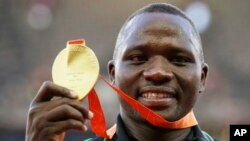Julius Yego wanted to be an athlete, only he couldn't run very fast.
That can be a significant setback growing up in the highlands of western Kenya, where the best distance runners in the pre-eminent distance-running nation are molded. When it comes to sport, running is just about all that matters in Kenya.
So Yego had to come up with a different plan to succeed.
With the help of a sharpened stick, an "elastic" right wrist, and YouTube videos as a substitute for a coaching manual, he became a javelin world champion instead.
"Javelin is the sport in me, part of my blood," he said. "I can't sprint. I can't compete in the 800 meters or the 100 meters. Javelin is the main talent I had."
Yego, a world champion who isn't a distance runner, goes against trends in Kenya and in international track and field in a refreshing way.
Forget convention — imagine a Jamaican winning a world title in the 10,000 meters, or an Ethiopian gold medalist in the 100 sprint.
Even that doesn't encapsulate the essence of the journey of a boy from a rural farming village in the Great Rift Valley who practiced with sharpened sticks he cut off trees, and used online videos to teach himself to launch a javelin as far as the best from Scandinavia, Germany and Eastern Europe.
He launched one, a sleek metal one, further than them all last year to win the world championship title in Beijing.
When Yego threw 92.72 meters, hurling himself face-first onto the ground as the javelin left that fabulously flexible right hand, he catapulted into the top three best javelin throwers ever. His effort was the eighth furthest in history. Only the great Jan Zelezny (who has six of the top eight throws) and Aki Parviainen have thrown a javelin further.
There isn't another African on that list of leading throws. There isn't another non-European in the top 30.
"When I saw the Javelin fly I knew it was a huge, huge, huge throw," Yego said, recalling that effort.
The first Kenyan to win a world title in a field event. An African record. The first man in 14 years to throw more than 92 meters. Only the fifth man ever to top 92 meters. All tremendous achievements, yet it very nearly didn't happen.
In Cheptonon village in the Rift Valley, a young Yego thought he could succeed in javelin, believing he had a gift.
"My strength is my hand," he said. "It is flexible and elastic. Very nice."
For years, though, he was the only one who believed it.
He got very little help as his career progressed, so he turned instead to the internet.
He'd make his way to the closest internet cafe to his village and watch YouTube videos of the great Zelezny, his favorite, and others. Then he'd go home and put into practice what he'd seen. It was still tough. As recently as 2008, Yego, training alone and unnoticed, considered giving up when he was overlooked for the world juniors.
"At that point I didn't want to do the javelin because there was no support," he said in an interview with The Associated Press in Kenya. "Support was for the 800 meters ... up to the marathon. They overlooked the field events."
He stuck at it, though, and threw 75 meters in 2010. Encouraged, he kept watching the online videos, tweaking his training and technique. He won the All-Africa Games title in 2011 with a national record. More YouTube.
In the buildup to the 2012 Olympics, Yego got the chance to go to Finland and work with coach Petteri Piironen. After returning home, he kept in contact with Piironen through Skype. He still consulted his quasi-coach, too: YouTube.
Yego made the Olympic final by going past 80 meters. A Commonwealth Games title came in 2014 with 83.87. And then last year in Beijing, the world championships gold.
People are taking notice now.
Yego is a star in Kenya, where he's known as the "YouTube man." He's quite happy with the attention after spending so many years being ignored for the distance runners.
"Being a world champion is a great thing," said Yego, who now wears sponsored training gear emblazoned with '92.72.' "Everyone looks at you."
The unorthodox throwing style, sometimes flying headlong onto the ground as he releases the javelin to give it every last bit of power and momentum, also makes good viewing.
"The falling is not a technique," he said. "Sometimes it happens, sometimes it doesn't."
Faced with those options a decade ago, Yego made it happen — with some help from the internet.






